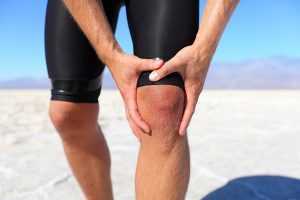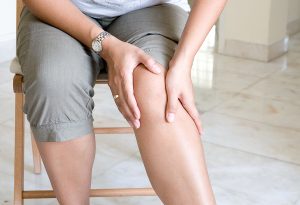An AARP study found that 32% of women going through menopause experienced joint and muscle pain. A Duke University School of Medicine and University of Central Florida College of Medicine study reports that 70% of women will feel musculoskeletal pain during menopause, and 25% of those women will find the pain is disabling.
Perimenopause and menopause do more than cause hot flashes and changes to your menstrual cycle. You may find the pain disrupts your daily routines. Hormonal changes do affect joint health, but you can take steps to limit the pain and Premium Sports & Orthopedics is here to help.
The Impact of Hormones on Your Body
The role of your body’s hormones is to tell the rest of your body what to do. Hormones are blood chemicals that act as messengers, telling your organs, muscles, and other cells and tissues what they need to do and when to do it. Among the many things that hormones help regulate or control are:
- Blood pressure
- Core temperature
- Development and growth
- Electrolyte balance
- Metabolism
- Mood
- Sexual function (including menstruation)
- Sleep-wake cycles (melatonin release)
Why Do Joints Hurt?
A joint forms where two bones meet. Those bones have cartilage covering the ends to ensure the bones glide nicely as the bones bend and straighten. The joint also has synovial fluid that acts as a lubricant. Joints are where two bones meet. Cartilage covers the ends of bones, ligaments hold bones together, and tendons secure muscles to the bones.
When any of these parts fail to function correctly, joint pain occurs. Hormones impact everything from bone density to inflammation.
Take a closer look at specific hormones that help with bone, joint, and muscle health.
- Estrogen promotes collagen production, joint lubrication, and reduces inflammation.
- Parathyroid hormone (PTH) impacts your calcium balance for bone health.
- Testosterone also helps with collagen production, bone density, and reduces inflammation. If testosterone levels are low, it can weaken the joints.
- IGF-1 and other growth hormones aid tissue and cartilage repair and cell production.
What Happens as Estrogen Levels Change?
When you enter perimenopause, estrogen levels change. While you think of estrogen as the trigger to reproduction and menstruation, there’s far more to it.
Estrogen keeps your bones strong and healthy by preventing osteoporosis. Low bone density impacts about 19.6% of women compared to 4.4% of men (age-adjusted). Looking at only women and men aged 50 or older, the rates skyrocket to 51.5% of women and 33.5% of men.
Osteoporosis is a disease where your bone tissue, structure, and strength all weaken. If you fall, a bone fracture is more likely to occur.
That’s just a small part of the impact of lowered estrogen on the bones within a joint. Estrogen also helps keep your cartilage strong. Add the anti-inflammatory properties, which keep joints from swelling. All of this works together to keep your joint healthy, working normally, and not sore.
As estrogen levels drop with menopause, you notice your joints feel different. You stand up after sitting for a while or driving a distance, and your joints are stiff. It takes extra time to get them feeling loose again.
In the middle of the night, you wake up with your back, hips, knees, or neck feeling sore. Shifting positions only helps for a while. It does impact your sleep, however, so you’re waking up earlier and tired long before your usual bedtime.
You also have weaker bones. Calcium-rich foods and supplements may help. Your doctor may prescribe or recommend certain supplements after a bone density test. If you fall, the risk of bone or joint damage is higher because bones aren’t always as strong as they were.
Testosterone Isn’t Just for Men
Testosterone is the main hormone in men, but women also have small amounts. Those amounts also decline in both men and women as they age. Testosterone depletes during menopause in women and andropause in men.
The loss of testosterone also affects joint health. Testosterone is important for muscle strength. Lower testosterone means less muscle mass. It also has a role in preventing inflammation.
Because of this, people with lower testosterone levels often experience achy joints, in part due to weakened muscles.
Chronic Stress Damages Your Joints
When you’re continually stressed, anxiety attacks are just one part of what can happen. Your joint health is also impacted over time.
High stress releases excess cortisol, which is usually anti-inflammatory. When cortisol is continually released, it leads to inflammation that impacts many areas of your health, including the loss of cartilage, which increases joint pain and bone loss.
The problem is that menopause also triggers the release of cortisol in some women. Even if you don’t feel stressed, the hot flashes, hormonal changes, and unusual period patterns can all impact your body’s response and release of cortisol.
Thyroid Issues Can Impact Joint Health
Thyroid hormones don’t necessarily cause problems unless your thyroid is underactive or overactive. Hormonal fluctuations can trigger thyroid issues. It’s estimated that as many as 20% of women over 60 have an underactive thyroid.
An underactive thyroid (hypothyroidism) often causes fluid retention and swelling. That can trigger joint pain. An overactive thyroid (hyperthyroidism) impacts the bones and muscles. The osteoporosis risk is greater, and muscles are less supportive, which impacts your joints.
Key Steps Towards Healthy Joints
You can’t stop menopause or other hormonal impacts on your joint health, but you can take other steps to keep your joints healthy.
- De-stress: Avoid excessive stress. If things are getting overwhelming, take a break and do something you love or get outside for fresh air during a walk.
- Diet: Eat a balanced diet and lean towards anti-inflammatory foods like leafy greens, fish, nuts, seeds, olive oil, whole grains, and berries.
- Exercise: Keep your muscles strong by getting enough exercise. Aim for 30 minutes a day of moderate activity or more.
- Hormone Therapy: Consider hormone therapy. While there are risks, it may help you. Talk to your doctor about it.
- Lose Weight: If you are overweight, talk to a doctor about a doctor-assisted weight loss program that helps you lose weight in a safe manner while also keeping it off. Fad diets aren’t going to help.
- Sleep: Aim for seven to eight hours of sleep per night.
- Supplements: Ask your doctor if calcium supplements, vitamin D, or omega-3 fatty acids in fish or flaxseed oil supplements might help with joint health.
So many things play a part in joint pain. You don’t have to have suffered an injury to find your joints are aching and distracting. But, when you know the role hormones play in joint pain, you also have information that helps with pain management.
Don’t ignore the pain. See a doctor and have your bone density checked if you’re 65 or older or younger if there’s a family history of osteoporosis. Work with a specialist in orthopedics to learn other ways to support your joint health. Relief is available. You just need to take the first step. Schedule a consultation with the team at Premium Sports and Orthopedics.







